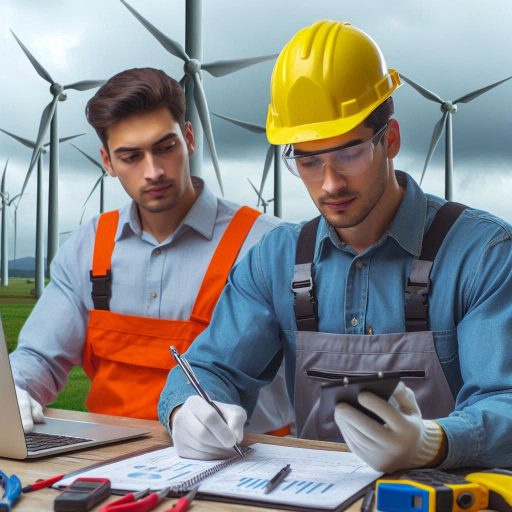Introduction
Wind Turbine Technician Skills and Qualifications are vital in maintaining and repairing wind turbines, ensuring they operate efficiently and contribute to renewable energy production.
These professionals are responsible for troubleshooting and fixing mechanical, electrical, and hydraulic systems, making their role highly specialized and technical.
Given the complexity of the job, wind turbine technicians must possess a robust set of skills and qualifications.
The ability to work at great heights is a fundamental requirement, as technicians often perform maintenance on turbine towers that reach hundreds of feet into the air.
Physical fitness, safety awareness, and comfort with heights are crucial for their safety and effectiveness.
Additionally, a deep understanding of wind turbine systems, including how to diagnose and repair issues, is essential.
Proper training, often through specialized programs or apprenticeships, and obtaining relevant certifications are key to ensuring that technicians can perform their tasks safely and efficiently.
The importance of these skills and qualifications cannot be overstated, especially as the demand for wind turbine technicians continues to grow with the expansion of the renewable energy sector.
Education and Training Requirements
High School Diploma or Equivalent
A high school diploma or equivalent is essential for aspiring wind turbine technicians.
This basic educational requirement ensures foundational skills in mathematics, science, and technical subjects.
These skills are vital for understanding the complex systems involved in wind turbine operation and maintenance.
Students should focus on courses like physics, algebra, and mechanical drawing.
These subjects help build the analytical and problem-solving abilities necessary for the role.
Additionally, a diploma demonstrates the ability to complete a structured program, which employers value when hiring.
Technical Training or Certification in Wind Energy Technology
Technical training or certification in wind energy technology is crucial for entering the wind turbine technician field.
These programs offer specialized education in turbine systems, electrical systems, and safety protocols.
They also provide hands-on experience with wind turbine components, which is invaluable for new technicians.
Many community colleges and technical schools offer certificates or associate degrees in wind energy technology.
These programs typically cover essential topics such as electrical troubleshooting, hydraulic systems, and mechanical repair.
Completing a recognized certification program can significantly enhance employment prospects.
On-the-Job Training May Be Required
Even with a diploma and technical training, on-the-job training is often required for wind turbine technicians.
This training allows new hires to apply their theoretical knowledge in real-world scenarios.
During this period, technicians learn specific protocols and practices unique to the company or wind farm.
They may also receive training in advanced troubleshooting techniques and specialized equipment.
On-the-job training typically involves working under the supervision of experienced technicians.
This mentorship helps new technicians gain confidence and competence in their role.
Employers expect technicians to learn quickly and adapt to the dynamic conditions of wind energy production.
Becoming a successful wind turbine technician requires a combination of education, technical training, and practical experience.
A high school diploma lays the foundation, while specialized training programs equip technicians with the necessary skills.
On-the-job training ensures they can apply their knowledge effectively in the field.
Continuous learning and skill development are crucial for staying relevant in this dynamic industry.
By meeting these qualifications, wind turbine technicians can contribute to the growing demand for renewable energy and help shape a sustainable future.
Mechanical Aptitude
Understanding of Mechanics, Electronics, and Electrical Systems
A wind turbine technician must possess a solid understanding of mechanics, electronics, and electrical systems.
These technical skills are vital for maintaining and repairing the complex machinery within wind turbines.
Technicians regularly work with intricate mechanical and electrical systems, making it essential to know how these systems interact.
Mechanics involves understanding how turbine blades move and generate power, while electronics and electrical systems require knowledge of circuits, sensors, and control mechanisms that manage turbine operations.
This comprehensive understanding ensures that technicians can maintain optimal turbine performance.
Ability to Troubleshoot and Repair Complex Machinery
Wind turbines are complex machines with many moving parts and electrical components, making the ability to troubleshoot and repair them a crucial skill.
Wind turbine technicians must quickly diagnose issues, identify faulty parts, and execute repairs efficiently.
This capability minimizes downtime and maximizes the efficiency of wind energy operations.
Troubleshooting often involves using diagnostic tools and software to analyze data and identify problems.
The ability to effectively troubleshoot and repair complex machinery is essential for maintaining the reliability of wind energy systems.
Knowledge of Wind Turbine Components and Operation
Extensive knowledge of wind turbine components and their operation is fundamental for wind turbine technicians.
Understanding how each part contributes to the overall function of the turbine is critical.
This includes familiarity with key components such as the rotor, generator, gearbox, and control systems.
Technicians must also stay updated on the latest technologies and improvements in turbine design.
This knowledge enables them to perform maintenance, address problems swiftly, and ensure that turbines operate at peak efficiency.
A strong grasp of wind turbine components and operation is essential for maintaining the performance and longevity of these complex machines.
Basically, the role of a wind turbine technician demands a deep understanding of mechanics, electronics, and electrical systems, alongside the ability to troubleshoot and repair complex machinery.
Additionally, comprehensive knowledge of wind turbine components and their operation is essential.
Mastery of these areas ensures that wind turbines run smoothly, contributing to the reliability and efficiency of wind energy production.
Physical Fitness and Safety Awareness
Physical fitness and safety awareness are key components of being a successful wind turbine technician.
The nature of the job requires individuals to have the physical stamina and strength to work in challenging environments and conditions.
Let’s delve into the specific skills and qualifications needed in this area:
Comfort with Working at Heights
One of the primary tasks of a wind turbine technician involves climbing towers to perform maintenance and repairs.
This requires a high level of comfort with working at heights, as technicians often have to navigate vertical ladders and platforms that can be several hundred feet above the ground.
Individuals who are prone to vertigo or have a fear of heights may struggle in this aspect of the job.
Ability to Lift Heavy Equipment
Wind turbine technicians are responsible for handling and installing heavy components, such as gearbox assemblies, rotor blades, and generators.
As a result, they must possess the physical strength and ability to lift and maneuver these items safely.
Regularly lifting heavy equipment can be physically demanding, so being in good physical shape is essential for this aspect of the job.
Commitment to Following Safety Protocols
Working on wind turbines can be hazardous, especially given the heights involved and the complex machinery being operated.
Wind turbine technicians must adhere to strict safety protocols and procedures to minimize the risk of accidents and injuries.
This includes following proper lockout/tagout procedures, wearing appropriate personal protective equipment (PPE), and maintaining awareness of their surroundings at all times.
A strong commitment to safety is non-negotiable in this field.
Generally, physical fitness and safety awareness are critical attributes for wind turbine technicians.
Individuals must be comfortable working at heights, able to lift heavy equipment, and dedicated to following safety protocols to ensure a safe and successful career in this industry.
Read: Interview Tips for Aspiring Radiologic Technologists
Problem-Solving Skills
Analytical Thinking and Ability to Diagnose Issues
Wind turbine technicians must excel in analytical thinking.
Diagnosing issues within complex systems requires sharp, focused minds.
Technicians encounter unexpected problems that disrupt operations and need precise analysis.
They must analyze data, interpret signs, and quickly identify the root cause of issues.
Understanding the intricate workings of wind turbines allows them to diagnose problems with accuracy.
This ability reduces downtime and prevents minor issues from escalating into major failures.
Technicians use their analytical skills to maintain a turbine‘s optimal performance, ensuring reliability and efficiency.
Creative Approach to Finding Solutions to Technical Challenges
Creativity is essential for wind turbine technicians.
Technical challenges often require innovative solutions.
Standard procedures may not always be sufficient, especially in unpredictable field conditions.
Technicians must think creatively to solve problems on the spot.
This might involve improvising tools or developing new methods to complete tasks.
Creativity ensures that technicians can address issues even when resources are limited.
In remote or challenging environments, a creative approach helps keep turbines operational.
Technicians who can innovate effectively can maintain functionality and overcome obstacles efficiently.
Quick Decision-Making Under Pressure
Quick decision-making is crucial for wind turbine technicians.
They frequently face high-stakes situations, such as sudden weather changes or equipment malfunctions.
These scenarios demand swift, sound decisions to prevent accidents and ensure smooth operations.
Delays in decision-making can increase risks and extend downtime.
Technicians must assess situations rapidly and choose the best course of action.
Remaining calm and composed under pressure is essential for making effective decisions.
This skill helps technicians maintain safety and operational efficiency, even in stressful conditions.
Therefore, wind turbine technicians require strong analytical thinking, creativity, and quick decision-making skills.
These abilities enable them to diagnose issues accurately, develop innovative solutions, and make effective decisions under pressure.
Combined with their technical expertise and physical capabilities, these attributes ensure they can handle the demanding challenges of their profession.
Their proficiency in analyzing, innovating, and deciding quickly is vital for keeping wind turbines running smoothly and contributing to the success of renewable energy initiatives.
Read: Quality Control Inspector: Entry-Level Guide
Communication and Teamwork
Effective Communication with Colleagues, Supervisors, and Clients
Effective communication is crucial for wind turbine technicians when interacting with colleagues, supervisors, and clients.
Technicians must convey technical information clearly and provide updates on maintenance and repair activities.
They need to explain complex issues in understandable terms to ensure everyone comprehends the situation.
This clarity helps in coordinating efforts and addressing concerns promptly.
Communicating effectively also involves listening to feedback and instructions, which aids in preventing misunderstandings and improving overall efficiency.
Collaborative Approach to Working with Others on Maintenance and Repair Projects
A collaborative approach is essential when wind turbine technicians work on maintenance and repair projects.
Technicians often need to coordinate with engineers, project managers, and other technicians to complete tasks efficiently.
Working together fosters teamwork and ensures that all aspects of a project are managed properly.
Technicians must be open to sharing knowledge and expertise, which enhances problem-solving and promotes innovative solutions.
Effective collaboration ensures that tasks are completed accurately and on time, contributing to the overall success of the project.
Transform Your Career Today
Unlock a personalized career strategy that drives real results. Get tailored advice and a roadmap designed just for you.
Start NowAdaptability to Changing Work Environments and Schedules
Adaptability is a vital skill for wind turbine technicians, who must adjust to changing work environments and schedules.
Work conditions can vary from different turbine sites to weather-related challenges, requiring technicians to remain flexible.
Adapting to these changes without compromising work quality is essential.
Technicians must also handle varying workloads and unexpected changes in project scopes.
Effective adaptability involves prioritizing tasks and managing time efficiently to ensure all maintenance and repair work is completed.
Being adaptable helps technicians address unexpected issues and maintain operational efficiency despite fluctuating conditions.
In review, effective communication, a collaborative approach, and adaptability are crucial skills for wind turbine technicians.
Technicians need to communicate clearly with colleagues, supervisors, and clients to ensure smooth operations.
They must collaborate effectively with others on maintenance projects and adapt to changing work environments and schedules.
Mastery of these skills enhances the efficiency and safety of wind turbine operations, contributing to the success of wind energy projects.
Read: Common Mistakes in Quality Control Inspections

Find Out More: Salary Insights for Quality Control Inspectors
Uncover the Details: Automotive Engineers: Essential Tools and Software
Attention to Detail and Precision
Accurate Record-Keeping and Documentation of Maintenance Tasks
Wind turbine technicians must excel in accurate record-keeping and documentation.
Maintaining precise records of maintenance tasks is crucial.
These records track every service, repair, and inspection performed on the turbines.
Clear documentation helps ensure compliance with regulatory requirements.
It also facilitates future maintenance planning and troubleshooting.
Technicians must log details such as date, time, parts used, and work performed.
Accurate records allow for efficient tracking of turbine performance over time.
This information aids in identifying recurring issues and planning preventive maintenance.
Thorough Inspection of Turbine Components for Wear and Damage
Thorough inspection of turbine components is another critical skill.
Technicians must regularly check for signs of wear and damage.
This involves examining blades, gearboxes, and generators for any abnormalities.
Inspecting these components helps prevent potential failures and extends the turbine‘s lifespan.
Technicians use various tools and techniques to detect issues early.
They look for cracks, corrosion, and other signs of deterioration.
Addressing these problems promptly can prevent costly repairs and minimize downtime.
A meticulous approach to inspections ensures turbines operate smoothly and efficiently.
Precision in Adjusting and Calibrating Equipment for Optimal Performance
Precision in adjusting and calibrating equipment is essential for optimal turbine performance.
Technicians must adjust various settings to ensure the turbine operates efficiently.
This involves calibrating sensors, controllers, and mechanical components with exact measurements.
Proper calibration maximizes energy production and ensures the turbine operates within safe parameters.
Technicians use specialized tools and equipment to make these adjustments.
Accurate calibration also helps in maintaining the turbine‘s reliability and efficiency.
Any errors in adjustment can lead to decreased performance or even mechanical failures.
In summary, wind turbine technicians must excel in accurate record-keeping, thorough inspections, and precise calibrations.
Detailed documentation supports effective maintenance and compliance.
Regular inspections detect wear and damage, preventing potential failures.
Precision in equipment adjustments ensures optimal performance and efficiency.
These skills are essential for the successful operation and longevity of wind turbines.
By mastering these aspects, technicians contribute significantly to the reliability and effectiveness of wind energy systems.
Their attention to detail and commitment to excellence help sustain the growth of renewable energy.
Read: Quality Control Inspector: Technical Skills Needed
Certifications and Licenses
When it comes to becoming a successful wind turbine technician, having the right certifications and licenses is crucial.
Let‘s delve deeper into each of these points to understand their importance in the wind turbine technician profession
Relevant Industry Certifications
Having industry-recognized certifications such as the North American Board of Certified Energy Practitioners (NABCEP) demonstrates your expertise and commitment to your craft.
Employers often look for these qualifications when hiring technicians.
Obtaining certifications not only enhances your skills and knowledge but also increases your credibility in the field.
It shows that you have met certain standards of competency and have the necessary skills to perform your job effectively.
State or Local Licenses
Depending on the state or region where you work, you may be required to hold specific licenses for electrical work.
These licenses ensure that you are compliant with local regulations and codes, guaranteeing the safety of the installations you work on.
Having the appropriate licenses also protects you from legal issues and liabilities, as unauthorized electrical work can result in severe consequences.
It is essential to adhere to the licensing requirements set forth by the governing bodies in your area.
Continued Education and Training
The wind energy industry is constantly evolving, with new technologies and regulations being introduced regularly.
As a wind turbine technician, it is crucial to stay updated on these changes through continued education and training.
Participating in training programs and workshops allows you to expand your knowledge base and enhance your skills in areas such as safety procedures, equipment maintenance, and troubleshooting techniques.
This ongoing learning process makes you a valuable asset to your employer.
In essence, certifications and licenses play a significant role in the success of a wind turbine technician.
By obtaining relevant certifications, acquiring necessary licenses, and staying informed through continuous education, you can position yourself as a competent and skilled professional in the field.
Conclusion
To excel as a wind turbine technician, mastering a range of skills and obtaining the right qualifications is crucial.
This role demands strong technical expertise in mechanical, electrical, and hydraulic systems, along with problem-solving abilities.
Proficiency in interpreting technical manuals, troubleshooting issues, and conducting repairs under pressure is also essential.
Safety is paramount in this field, making OSHA certification and comprehensive safety training indispensable.
Formal education in wind energy technology or a related field provides a solid foundation for aspiring technicians.
Hands-on experience is equally important, as it builds the practical skills needed to navigate the complexities of wind turbine maintenance and repair.
Certifications in specific areas, such as climbing and rescue, further enhance employability.
Aspiring wind turbine technicians should actively pursue training opportunities and gain as much field experience as possible.
The renewable energy sector offers a rewarding career path with significant growth potential.
As the demand for clean energy increases, so will the need for skilled wind turbine technicians.
By entering this field, you can contribute to a sustainable future while enjoying job security and opportunities for advancement.




